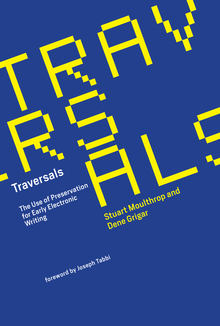Traversals : The Use of Preservation for Early Electronic Writing has been released. The book, published by The MIT Press, applies the pathfinders methodology and traversals process that Stuart Moulthrop and I developed in our Pathfinders project, to four works of electronic literature: Judy Malloy’s Uncle Roger, John McDaid’s Uncle Buddy’s Phantom Funhouse, Shelley Jackson’s Patchwork Girl, and Bill Bly’s We Descend. This first stage of our work resulted in a multimedia, open-source book, called Pathfinders: Documenting the Experience of Early Digital Writing.
: The Use of Preservation for Early Electronic Writing has been released. The book, published by The MIT Press, applies the pathfinders methodology and traversals process that Stuart Moulthrop and I developed in our Pathfinders project, to four works of electronic literature: Judy Malloy’s Uncle Roger, John McDaid’s Uncle Buddy’s Phantom Funhouse, Shelley Jackson’s Patchwork Girl, and Bill Bly’s We Descend. This first stage of our work resulted in a multimedia, open-source book, called Pathfinders: Documenting the Experience of Early Digital Writing.
The research for Pathfinders took place in ELL, the lab that I direct here at WSUV, with two of the traversals––McDaid’s and Jackson’s––also videotaped here. To write my chapters of Traversals, I spent much of my time reviewing the works on the computers in the lab and consulting the data Stuart and I collected in the Pathfinders book, even fine tuning that information as I delved further into comparing versions and conducting archival research at Duke’s and MoMA’s libraries.
What the project suggests, therefore, is that thorough research of electronic writing––specifically research involving digital textual analysis of born digital texts involving multimedia and interactivity––requires access not only to library collections like The Judy Malloy Papers at the David M. Rubinstein Rare Book & Manuscript Library but also to what Abigail De Rosnik calls “rogue archives” like ELL where electronic literary works can be experienced on computers they were originally published and intended to be viewed.
More importantly, our project shows that our methodology and process are well-suited for application to any kind of born-digital work, including video games.



